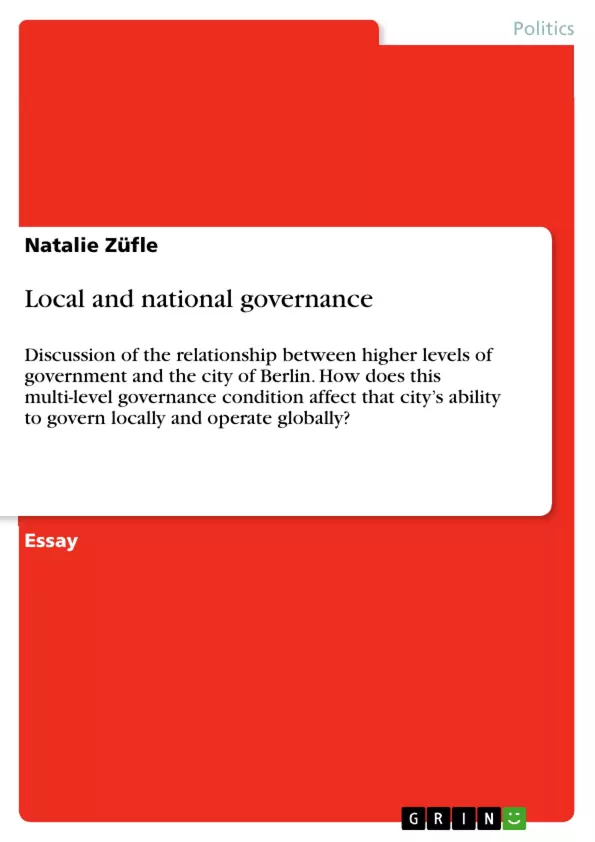Through a progressed decentralization of governance, Berlin has the opportunity to design and implement policies that meet the specific needs of its residents. Nevertheless, the strict requirements set by supranational institutions often create a conflict between the desires of different groups, especially with regard to global competitiveness and environmental protection.
Table of Contents
- Introduction
- Multi-level Governance in Berlin and Environmental Protection
Objectives and Key Themes
This paper examines the relationship between higher levels of government (the EU and Germany) and one city (Berlin) within a multi-level governance system. The analysis focuses on how this relationship affects Berlin's capacity for local governance and global engagement, specifically concerning environmental protection.
- Multi-level governance structures in environmental policy
- Balancing local needs with national and supranational regulations
- The impact of EU environmental regulations on Berlin's policy choices
- Trade-offs between economic competitiveness and environmental sustainability
- Citizen participation in environmental policymaking
Chapter Summaries
Introduction: This introductory section sets the stage by outlining the central research question: How does multi-level governance affect a city's ability to govern locally and operate globally? It uses the example of Berlin and its relationship with the EU and Germany, focusing specifically on environmental protection policies. The author highlights Germany's commitment to environmentalism and the EU's goals for sustainable development as the context for the study. The choice of Berlin as a case study is justified by its position as the capital and its role in implementing national and international environmental policies.
Multi-level Governance in Berlin and Environmental Protection: This section delves into the specific example of Berlin's implementation of EU climate protection measures. It details the EU's decision on stricter parameters for climate protection, including air quality limits, and the subsequent role of the German federal government in translating these requirements into national and local policies. The section then focuses on Berlin's response, highlighting the Landesenergieprogramm 2006-2010, a city-wide energy policy designed with citizen input. The introduction of the Umweltzone (green zone) is presented as a case study illustrating the conflict between environmental protection goals and economic competitiveness. The author illustrates how the imposition of stricter vehicle emission standards created tension between the need for economic development and adherence to environmental regulations, particularly highlighting the negative impact on local businesses. The difficulties in balancing these competing interests are thoroughly examined, showcasing the challenges inherent in multi-level governance within the context of environmental policy.
Keywords
Multi-level governance, environmental protection, Berlin, EU regulations, economic competitiveness, local governance, global engagement, sustainable development, citizen participation, policy implementation, Landesenergieprogramm, Umweltzone.
Frequently Asked Questions: Multi-level Governance in Berlin and Environmental Protection
What is the main focus of this paper?
This paper examines how multi-level governance structures (involving the EU, Germany, and Berlin) affect Berlin's ability to govern locally and engage globally, specifically concerning environmental protection.
What are the key themes explored in the paper?
Key themes include the interplay between multi-level governance and environmental policy, balancing local needs with national and supranational regulations, the impact of EU regulations on Berlin's choices, trade-offs between economic competitiveness and environmental sustainability, and citizen participation in environmental policymaking.
What is the significance of Berlin as a case study?
Berlin is chosen because it's Germany's capital and plays a crucial role in implementing national and international environmental policies. Its relationship with higher levels of government provides a compelling example of multi-level governance in action.
What specific examples are discussed in the paper?
The paper analyzes Berlin's implementation of EU climate protection measures, specifically focusing on stricter air quality limits and the resulting challenges. It uses the Landesenergieprogramm 2006-2010 (Berlin's city-wide energy policy) and the introduction of the Umweltzone (green zone) as case studies illustrating the complexities of balancing environmental protection with economic considerations.
What are the key challenges highlighted in the paper concerning multi-level governance and environmental protection in Berlin?
The paper highlights the tension between the need for economic development and adherence to stricter environmental regulations (as seen with the Umweltzone), illustrating the difficulties in balancing competing interests within a multi-level governance framework. It also underscores the challenges of translating supranational regulations into effective local policies.
What is the role of citizen participation in the context of this study?
The paper examines the role of citizen participation in shaping environmental policies, referencing the involvement of citizens in the development of the Landesenergieprogramm 2006-2010 as an example of successful integration of public opinion into policymaking.
What are the key takeaways from the chapter summaries?
The introduction establishes the central research question and context. The main chapter details Berlin's experience implementing EU climate protection measures, highlighting the complexities and trade-offs involved in balancing environmental goals with economic realities within a multi-level governance system. The challenges of translating supranational directives into effective local action are central to the analysis.
What are the keywords associated with this research?
Multi-level governance, environmental protection, Berlin, EU regulations, economic competitiveness, local governance, global engagement, sustainable development, citizen participation, policy implementation, Landesenergieprogramm, Umweltzone.
- Citation du texte
- Natalie Züfle (Auteur), 2008, Local and national governance , Munich, GRIN Verlag, https://www.grin.com/document/180120



